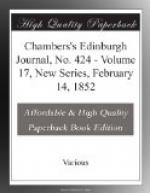A curious and saddening problem is the future of this great country. ‘France,’ said Robespierre in one of his moments of studied inspiration, ‘has astonished all Europe with her prodigies of reason!’ We are now witnessing the development of several of these astonishing prodigies; and the spectacle, to say the least of it, is instructive.
MY TRAVELLING COMPANION.
My picture was a failure. Partial friends had guaranteed its success; but the Hanging Committee and the press are not composed of one’s partial friends. The Hanging Committee thrust me into the darkest corner of the octagon-room, and the press ignored my existence—excepting in one instance, when my critic dismissed me in a quarter of a line as a ‘presumptuous dauber.’ I was stunned with the blow, for I had counted so securely on the L.200 at which my grand historical painting was dog-cheap—not to speak of the deathless fame which it was to create for me—that I felt like a mere wreck when my hopes were flung to the ground, and the untasted cup dashed from my lips. I took to my bed, and was seriously ill. The doctor bled me till I fainted, and then said, that he had saved me from a brain-fever. That might be, but he very nearly threw me into a consumption, only that I had a deep chest and a good digestion. Pneumonic expansion and active chyle saved me from an early tomb, yet I was too unhappy to be grateful.
But why did my picture fail? Surely it possessed all the elements of success! It was grandly historical in subject, original in treatment, pure in colouring; what, then, was wanting? This old warrior’s head, of true Saxon type, had all the majesty of Michael Angelo; that young figure, all the radiant grace of Correggio; no Rembrandt shewed more severe dignity than yon burnt umber monk in the corner; and Titian never excelled the loveliness of this cobalt virgin in the foreground. Why did it not succeed? The subject, too—the ’Finding of the Body of Harold by Torch-light’—was sacred to all English hearts; and being conceived in an entirely new and original manner, it was redeemed from the charge of triteness and wearisomeness. The composition was pyramidal, the apex being a torch borne aloft for the ‘high light,’ and the base shewing some very novel effects of herbage and armour. But it failed. All my skill, all my hope, my ceaseless endeavour, my burning visions, all—all had failed; and I was only a poor, half-starved painter, in Great Howland Street, whose landlady was daily abating in her respect, and the butcher daily abating in his punctuality; whose garments were getting threadbare, and his dinners hypothetical, and whose day-dreams of fame and fortune had faded into the dull-gray of penury and disappointment. I was broken-hearted, ill, hungry; so I accepted an invitation from a friend, a rich manufacturer in Birmingham, to go down to his house for the Christmas holidays. He had a pleasant place in the midst of some ironworks, the blazing chimneys of which, he assured me, would afford me some exquisite studies of ‘light’ effects.




